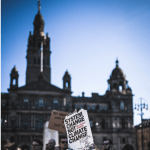(Blog by Water Aid Scotland, new members of SCCS)
At the end of May 2020, the United Nations made the decision to postpone COP 26 in Glasgow until November 2021. When it does happen, this conference will be the most important of its kind since COP 21 in Paris in 2015. That year, world leaders passed the “Paris Agreement”, which commits countries of the world to take urgent and transformative action to reduce greenhouse gas emissions and invest in climate adaptation. This agreement is seen by many as the last global treaty that has a real chance of saving the world from a climate catastrophe.
The Paris Agreement was passed in the wake of the terrorist attacks on the city just some weeks previous. Back then, world leaders were forced to take their attention away from the horror and tragedy of those events and focus on the much more intangible threat of climate change. The recent outbreak of COVID-19 across the world, and the very real human tragedy it causes, will again test the capacity of leaders to deal with multiple crises: but this time the solutions are the same. COVID has illuminated common injustices between these crises, the vulnerability of the poorest communities across the world to each. It is vital that world leaders at COP26 learn from the impacts of COVID-19, and the policy response to it, to deliver action that urgently invests in building resilience globally to all crises: health, climate or otherwise.
Whilst climate change often seems “intangible” to many in the world’s richest countries, it is a very real lived reality already for people in the global south. Millions of people in developing countries are already experiencing the impacts of global heating through rising sea-levels, increased frequency of droughts, floods and natural disasters, causing a deepening of precarity in their already marginalised livelihoods. The reason that it’s the poorest who will suffer most from climate change is not just a matter of geography. It is matter of poverty, of global economic injustice, and the associated lack of access to basic rights and services; particularly, lack of access to the most basic of human rights; to water, sanitation and hygiene (WASH).
Access to WASH globally is an emergency situation, and global targets to achieve universal access are still hundreds of years away (based on current rates of progress). 1 in 10 people globally do not have access to safe water, and 1 in 4 people globally don’t have access to basic sanitation. If this were true in Scotland, it would amount to 1.4 million people without a decent toilet, and the equivalent of the entire city of Glasgow having no access to water.
WASH has been underfunded for years by donors, and under-prioritised by governments globally. There a number of reasons for this: it is because the solutions to WASH are often not seen as innovative or “exciting”, because it requires a comprehensive approach, and because it is usually the poorest that do not have access: isolated villages in Nigeria, high-density urban villages in Bangladesh, or traveller communities here in Europe. The lack of access is also deeply gendered, with women and girls suffering first and most when access to WASH is stretched.
The COVID-19 pandemic has thrown light onto the importance of WASH: the first line of defence against this crisis. You cannot stay at home when do you do not have access to clean water, like 785 million people globally. You cannot protect yourself and your family from catching the virus, if you are one of 3 billion people globally who do not have access to handwashing facilities at home. When you do get sick, or if you are a front-line health worker, then you are likely also to not have protection, as 2 in 5 health centres globally do not have access to handwashing facilities, and 1 in 4 do not have clean water on site. The frightening reality is that climate change will further exacerbate this crisis, and decimate what progress has been made on achieving the Sustainable Development Goals.
When floods or rising sea-levels pollute water sources, people are left with no choice but to drink dirty water that could kill them. When weeks go by without rain, life for millions of people becomes dominated by the search for water. When life becomes consumed by the day-to-day search for water, education and improvement of livelihoods come second to basic needs. When children must walk long distances for water, they often miss out on school. And when adults barely have enough clean water to drink, they are less able to grow and sell food to support their families. Around the world, it’s women and girls who are most disadvantaged. Usually responsible for collecting water, they are in direct contact with the health risks of dirty water: when clean water is harder to find, women and girls have even less time for education or employment. What’s more, you cannot be resilient to anything, to COVID or to climate change, without access to WASH.
Water Aid Scotland has recently joined SCCS to help tackle the climate emergency together. When COP 26 comes to Glasgow, as a coalition we will ensure that the voices of those most affected by multiple crises are heard by the negotiators. We will make the case loud and clear that climate injustice, and water injustice, must not continue. It is vital that we learn lessons and take this opportunity to build a post-COVID planet that ensures basic rights, protection from harm and access to justice are normal for all.


